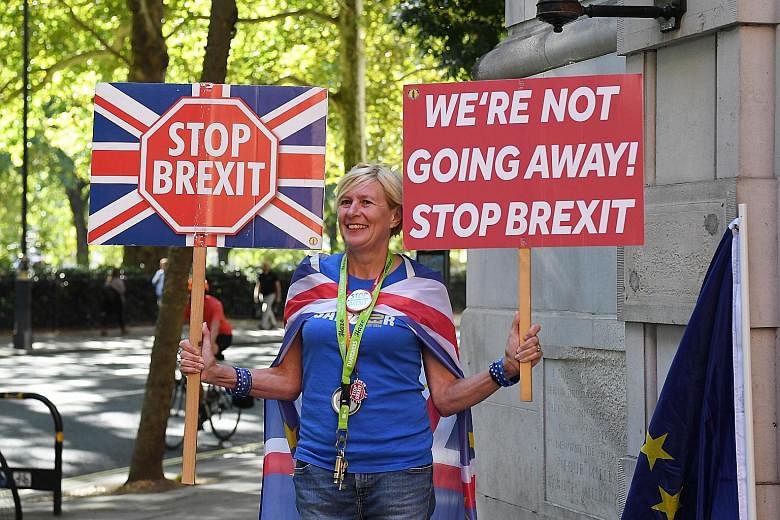LONDON • British Prime Minister Boris Johnson's move to suspend Parliament and make good on his promise to avoid any more delays to Brexit has set the clock running for his opponents to thwart him.
The question is whether they can do it in time. He was granted permission by the Queen to prorogue the House of Commons, shutting down the debating chamber no later than Sept 12 ostensibly so he can come back with a new legislative programme a month later.
That effectively gives parliamentarians two weeks to come up with a way to pass a law to stop Britain leaving the European Union on Oct 31 without a deal.
While Mr Johnson and his supporters say disruption would be manageable, companies warn of a severe hit to the economy.
It is enough time, in theory. Earlier in the year, a similar Bill passed in five sitting days. But even as opponents - from within his own Conservative as well as other parties - reacted with outrage at Mr Johnson's move on Wednesday, it remained unclear if they could make it happen.
Although there is a parliamentary majority against a no-deal Brexit, the problem for those trying to corral the opposition groups is that they all want different things. Many Members of Parliament in the opposition Labour Party want a second referendum. The result is everyone may be faced with Mr Johnson's version of a deal or the cliff edge.
One key player will be Mr John Bercow, the Speaker of the House of Commons. He described Mr Johnson's gambit as a "constitutional outrage". That suggests he will facilitate opposition plans to take control of the parliamentary agenda when Parliament returns on Sept 3. As the legislature's referee, he can rewrite the rules of the chamber.
The biggest question mark hangs over the Conservatives. For all of the time Mr Johnson's predecessor Theresa May was in office, the problematic section of the party was the pro-Brexit bloc. It repeatedly pushed her to go further and then tried to throw her overboard. Conservatives who wanted a softer Brexit, or no Brexit at all, were much smaller in number.
But Mr Johnson's arrival saw ministers, including Chancellor of the Exchequer Philip Hammond, leaving government jobs, many offering warnings that they would not allow the new leader to risk a no-deal.
There are now around 40 Tories who have indicated a willingness to rebel to prevent a no-deal Brexit. That is easily enough to overturn Mr Johnson's parliamentary majority of just one - if they decide to.
"The prorogation can't be stopped, but he won't escape Parliament by doing this," said Mr Dominic Grieve, a Conservative lawmaker and vocal Brexit opponent.
Then there is Labour. Labour leader Jeremy Corbyn is more attracted by the idea of a general election, although he has accepted he would have to offer a referendum.
Though a handful of Tories want to cancel Brexit, most of them want Brexit to happen with a deal.
Labour this month proposed a vote of no confidence in Mr Johnson, after which Mr Corbyn would be installed as a caretaker prime minister, with a mandate to seek a Brexit delay and call an election.
As Mr Johnson's opponents try to agree on a plan and rebel Tories decide how rebellious they really are, the government is moving to chip away at their votes.
The ground for Wednesday's move was laid on Tuesday, with an official saying Britain now saw the prospect of EU leaders moving towards giving Mr Johnson the changes he wanted to the Brexit agreement that Mrs May negotiated. Alongside that, Mr Johnson's office signalled that the Prime Minister might be willing to moderate his demands.
The underlying message to Conservative MPs worried about no-deal was that if they just gave Mr Johnson time, he would be able to deliver a new Brexit deal and present it to Parliament in triumph. Mr Johnson has also pointed out that there would still be time when Parliament returned to stop a no-deal departure if he failed.
He said on Wednesday that his decision to seek the suspension of Parliament was about being able to push forward his agenda on health, crime prevention and education.
Mr Johnson's move restricts his opponents' room for manoeuvre, and forcing them into a corner could be counterproductive. Suspension means the rebels know they will have only one chance.
It will not be a long wait to see how they use it while Mr Johnson's Brexit hardliners stand firm.











